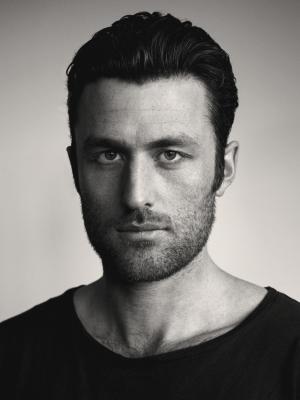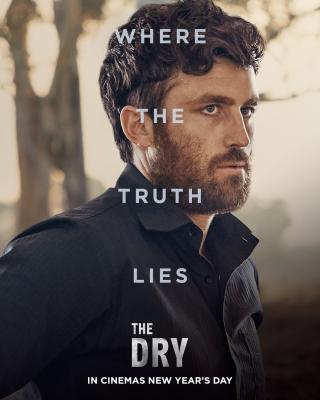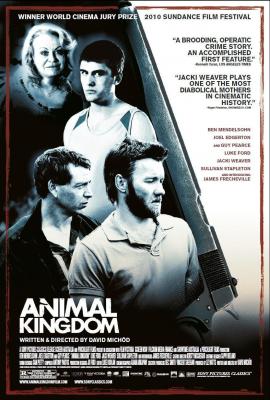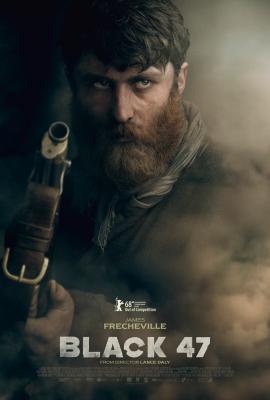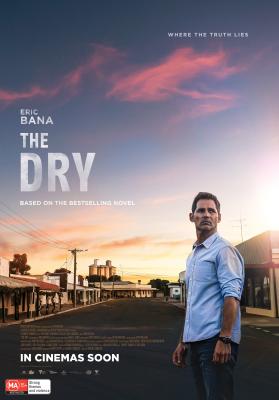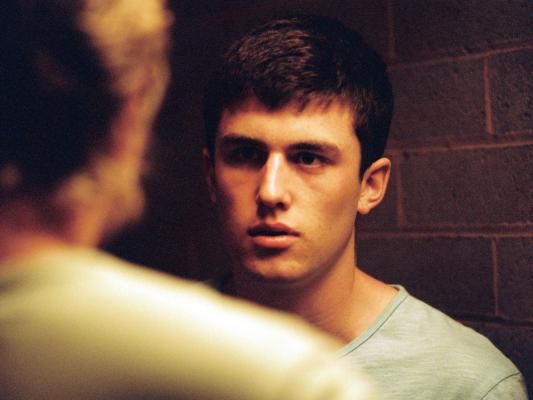Every actor dreams of appearing in a major film or theatre production. With it comes the possibility of fame and a pathway to secure employment. But more than that, to appear in a great film, one that takes a hold of the public’s imagination and enters the cinematic canon to be watched and re-watched for decades to come, is surely the mountain-top for any creative artist dedicated to the craft of film.
James Frecheville, a 29-year-old actor from Melbourne, can claim to have struck magic twice already in his short career with his small but crucial performance in this year’s remarkable Eric Bana-headlined film The Dry, which comes some 10 years after his breakout performance in the now-canonical Australian crime film Animal Kingdom.
Star Weekly was lucky enough to speak at length with Frecheville in a wide-ranging conversation about his latest role in The Dry, why the film has been so well received by the public and critics alike and how he successfully navigates the tough and precarious world of acting.
The Dry
The Dry is based on the debut novel by Jane Harper and Frecheville credits the popularity of the book in part for the film’s astonishing success.
“I think it’s a combination of the success of Jane’s book, and it having a sort of pre-established place in people’s heads. But also, last year was pretty terrible, on many fronts. And I think people just are eternally optimistic. I think people are really excited to get out of the house and do something that they were nostalgic about. Which sounds insane, to say that you’re nostalgic about going to the cinema, but nobody had any of it, for such a long time,” he said.
With critical acclaim and domestic box office receipts breaching $10 million, The Dry is the hit film for the month of January and suggests that there remains in people an entrenched desire to retain the full cinema experience, even in an age characterised by isolated online streaming.
“It’s all about a shared, disruption-free experience,” Frecheville said.
“Being a part of a community, whether you know anybody or not, just in that kind of setting, it’s pretty important.”
Locked in a darkened space before a massive screen, cinema-goers are treated to an entrancing mystery film that unfurls carefully around two shocking events events separated by decades. The film has about it the smack of greatness. Though ostensibly a police procedural, it builds to become a haunting meditation on the power of memory and the majesty of friendship, precisely acted, written and photographed across the desolate beauty of regional Victoria.
“It’s looks great and the film’s great, and it’s as simple as that,” Frecheville says.
Frecheville plays the role of Jamie Sullivan, a gruff young farmer struggling to keep his farm afloat while also looking after his grandmother.
Like the film itself, there is a degree of manipulation involved in how the audience perceives Sullivan, a product of Mr Frecheville’s acting abilities and the careful planning of director Robert Connolly. Sullivan appears to us in a certain light at the beginning of the film, and then our perception of him shifts and changes as the film progresses.
“The trick wasn’t really up to me,” Frecheville said.
“That’s in the coverage, that’s in the editing and the sound, and most of that falls on to Rob. What I tried to focus on was taking as much from the script and from the book as I could to find something to anchor the idea of Jamie Sullivan around. There was a part in the book where it said that he had his fists stuffed under his armpits. And I kind of thought that was interesting, just because, like many people within the film, they’ve all got secrets.
“He just had a pretty high guard. It’s not really a nice place to live. But, you know, he’s not one to complain.”
Initially, Frecheville auditioned for the role of Sergeant Greg Raco, played by Keir O’Donnell.
“I wasn’t right for that part, but my name got thrown into the hat for Jamie Sullivan, and that was it.”
Asked whether he can sense a film’s potential for greatness from the script alone, he responds by saying that while a script may be redolent of something, it is always difficult to know how a film will turn out given the medium’s tendency to morph and shift across the multiple stages of the creative process.
“You do get a sense. A good script should convey imagery and thought. And then, you’re on set, and things change constantly. It’s just blueprints layered on blueprints until the edit, at which it could even change quite violently again. Sometimes I’ve seen that with films that I’ve done where the tone of what you thought you were being involved in just becomes completely different.”
Breakout
Ten years before he would take on the role of Jamie Sullivan, Frecheville auditioned as a high schooler for the seminal role of Joshua Cody in David Michod’s operatic Animal Kingdom. Listed by Quentin Tarantino as one of his favourite films of the decade, it has since become the source material for a popular television show set in Southern California and is regularly listed by critics as one of Australia’s greatest films.
Frecheville’s stunning performance as an impressionable young man thrown suddenly into a dangerous world and then trying, in his limited way, to extricate himself from an escalating hurricane of violence anchors the film and imbues it with a complex moral code. The film isn’t nihilistic, but it’s brutally jaundiced about human nature and the reach of justice in this world.
The Dry, by contrast, offers a somewhat more hopeful view about the possibility of securing justice, despite the shocking acts of violence that open and close the film and the shadow of abuse that permeates the story. A degree of clarity, at least, is granted to the audience by the end of the film, whereas Animal Kingdom leaves us in a more troubled state. We are as unsure of Frecheville’s Cody at the end of the film as we are at the beginning. His method of closing out the story is as much a recognition of terrible failure as it is an act of brute righteousness.
Australian Cinema
Frecheville lists Wake in Fright, Bad Boy Bubby, Chopper, Two Hands, Babe, Happy Feet and Mad Max as some of his favourite Australian films.
“Australia makes great films. I just hope that the frequency of telling Australian stories can kind of speed up the more the borders open up.”
He is optimistic about the future of the Australian film industry.
“People need stories. I’m interested with what sort of emerging technologies can start making different sorts of stories possible. It seems to me that the Australian industry is just absolutely booming. In the sense that a lot of international productions are coming there because they know that people work well and that it’s suitable to make big movies on a sort of world-class level.”
What’s more, alongside Australia’s world-class human capital and technological sophistication, our relative success in containing the virus also makes us an increasingly attractive destination for film production. This year will see a number of major Hollywood productions shoot in Australia, including the Liam Neeson-helmed action blockbuster Blacklight.
From LA to the UK
Frecheville spoke to us from Wales via Zoom, ‘trapped’ in Britain’s extended lockdown restrictions.
“My partner and I came up here for Christmas and then Boris Johnson put the lockdown issue out, so we’re now sort of up here for series two of lockdown, because we were up here most of last year as well.”
When not in lockdown, Frecheville lives in London, having moved there from Los Angeles for a change in scene.
“I spent a lot of time in Los Angeles and ultimately wanted to try out a different setting. I didn’t really want to spend all of my twenties there. And Europe’s great and I’ve got a lot of friends in London. And I have a very soft spot for Ireland.”
Asked whether he thinks the deep friendships that anchor The Dry are still possible in the age of Zoom, Mr Frecheville replies: “I think it’s too early to say. I think sustaining deep friendships is easy. In a way, not much has changed for the way that I sustain my friendships, because I’ve got friends in all these different places.”
“But I’m just optimistic that things will get better. I can’t really see us holding into a sort of new lockdown paradigm for the next 10 years. And thinking that a whole new generation of kids never go to school. I’m more optimistic than that. But maybe not, maybe this virus just keeps mutating forever and ever.”
A Natural Optimist
Though The Dry and Animal Kingdom are perhaps his most widely-known contributions, Frecheville has appeared in an impressive roster of well-received films in a career that now spans more than 10 years. In 2018, he took on the lead role of Feeney in Black 47, an historical drama set in a famine-ravaged 19th century Ireland and in 2015, he appeared alongside Billy Crudup in the critically acclaimed Stanford Prison Experiment.
In regards to his own creative future, he hopes at some point to pursue writing and directing in addition to acting.
“But when I was writing when I was younger, it wasn’t ready or suitable enough to sort of get it to a point where it was fleshed out and out there,” he said.
“And tonally it’s quite different from my acting work. I’m kind of into a bit surreal, mad-cap comedy, sort of insane stuff. But yeah I’d totally want to explore that. But it’s just slowly slowly catchy monkey, is my idea the older I get, because I’m still learning. I’m still learning a lot.
“I came into it having done youth theatre. Animal Kingdom was a baptism by fire. And ever since then I’ve just sort of been a journeyman. I haven’t gone to a school. I didn’t go to university. I’ve sort of gone all in on this trade, and I’m just learning as much as I can. Seems to be working, somewhat.”
The acting trade has a well-established patina of glamour, full of red carpets and flashing cameras. For many though, it’s a tough and precarious way to make a living, and Frecheville knows both sides of the coin; the struggle involved in simply making one’s way in the trade, and also its possibility for grandeur and genuine achievement.
“I’ve been living by the skin of my teeth for years, it feels like. There’s nothing stable about it, but there’s also much victory and revelries as well,” he said.
For other young Australians who love cinema and hope one day to be involved in something permanent, Mr Frecheville has some advice.
“Be bold. Find like-minded people. Team up and make things. No one is going to sort of hand it to you. It’s always a great tip to be active. If you want to be an actor, start finding some friends that want to be actors and write silly movies and make them. And keep it fun, I’d say, because you don’t want a learning experience to be too serious or hard-core. I think consume as much media as you can. If you want to learn how to do things technically, you could watch a film and then watch it right back immediately after you’ve finished watching it the first time and pick it apart. Just be bold and be active, that’s what I’d say.”
The Dry is playing now in cinemas and Animal Kingdom is streaming on Stan.


